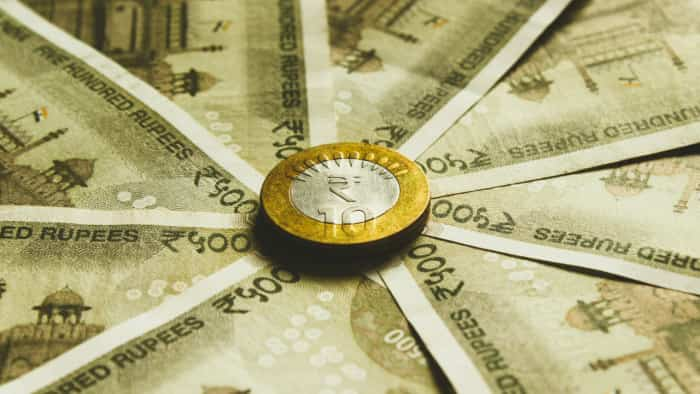As rupee stays near 83 vs dollar, should you pick export-heavy stocks?
The rupee saw a mild recovery on Friday from a record closing low of 83.14 against the US dollar the previous day, but remained well below the 83 mark amid weakness across emerging currencies thanks to a surge in the greenback.
)
The rupee saw a mild recovery on Friday from a record closing low of 83.14 against the US dollar the previous day, but remained well below the 83 mark amid weakness across emerging currencies thanks to a surge in the greenback. Analysts said that a risk-averse environment put pressure on the rupee, not far from an all-time low of 83.29, hit in October last year.
Could this be an opportunity for the average bull on Dalal Street? Market expert Ajay Bagga thinks otherwise.
He suggests investors avoid going long on export-focused companies just to chase weakness in the currency.
"In a possible earnings slowdown globally, the basis models of these companies from IT to pharma to textiles will be challenged. It is time to be cautious and wait a few months for more clarity on the global macroeconomic situation," he told Zeebiz.com.
"Weakness of the rupee is in line with the fall in other exporter currencies... China and Japan, for example, have also seen weakening of their currencies as the dollar has strenghtened in the past three weeks," he said.
The greenback has once again risen gradually. Although the US currency cooled off somewhat on Friday, it wasn't far from the highest levels recorded in two months this week.
Last year, the dollar index — which measures the American currencies against six peers other than the rupee — touched a 20-year high of 114.78 in October thanks to sustained appreciation over the past decade.
What has driven gains in the dollar — the most widely used currency for global trade — and put pressure on its emerging market peers?
Analysts point out a host of factors behind the dollar's strength:
- Concerns about global economic resilience
- Concerns about the health of banks
- Weak macroeconomic data from major economies
- Fears about more hikes in benchmark interest rates than anticipated earlier amid sticky inflation
ALSO READ: India's economy likely to continue to grow rapidly, although potential growth has come down: Moody's
Typically, financial uncertainty triggers increased buying in asset classes that are less risky compared to equities, such as bonds, gold and dollars. A stronger dollar, in turn, leads to far-reaching consequences for global asset prices, economic conditions, and the health of the global financial space.
The rupee has lost nearly two per cent of its value against the US currency over the past two weeks.

Which businesses benefit from a weaker rupee?
Weakness in the domestic currency augurs well for large exporters, which derive a significant chunk of their revenue from foreign markets. Many analysts believe Asian currencies such as the rupee are likely to remain out of favour with investors globally amid sustained weakness in the Chinese yuan.
"The rupee has been depreciating mildly against the US dollar... This theoretically creates an opportunity for investors looking to buy export-oriented stocks or sectors, such as IT, pharma, capital goods and chemicals," said Deepak Jasani, Head of Retail Research at HDFC Securities.
However, he also said that one has to be mindful of the risk of a global slowdown.
"If this plays out more going forward then we may see the realisations and margins of exporters getting squeezed and offset the benefit of rupee depreciation for investors," Jasani warned.
The road ahead for the rupee
Meanwhile, the country's foreign exchange (forex) reserves jumped by $708 million to $602.161 billion for the week ended August 11, the first increase after three back-to-back weeks of contraction, according to RBI data released on Friday.
The country's forex kitty, which had soared to an all-time high of $645 billion in October 2021, shrank as the central bank utilised dollars to defend the local currency amid pressure caused by unfavourable global developments.
"The RBI will be focussing on orderly rupee movements rather than trying to defend a level," Bagga added.
"Our current account deficit is not at worrisome levels, but a depreciating rupee does bring in inflation if the cost of higher imported commodities is passed on. For now, the government oil companies have not passed on higher oil prices to the consumer so we have not seen that impact.
Get Latest Business News, Stock Market Updates and Videos; Check your tax outgo through Income Tax Calculator and save money through our Personal Finance coverage. Check Business Breaking News Live on Zee Business Twitter and Facebook. Subscribe on YouTube.
RECOMMENDED STORIES
07:56 AM IST











 Anil Singhvi Market Strategy December 23: Important levels to track in Nifty50, Nifty Bank today
Anil Singhvi Market Strategy December 23: Important levels to track in Nifty50, Nifty Bank today Sebi introduces uniform data sharing policy for research purposes
Sebi introduces uniform data sharing policy for research purposes  Looking for short term investment ideas? Analysts suggest buying these 2 stocks for potential gain; check targets
Looking for short term investment ideas? Analysts suggest buying these 2 stocks for potential gain; check targets  Waaree Renewables Technologies board okays NSE listing
Waaree Renewables Technologies board okays NSE listing  Anil Singhvi Market Strategy December 19: Important levels to track in Nifty50, Nifty Bank today
Anil Singhvi Market Strategy December 19: Important levels to track in Nifty50, Nifty Bank today